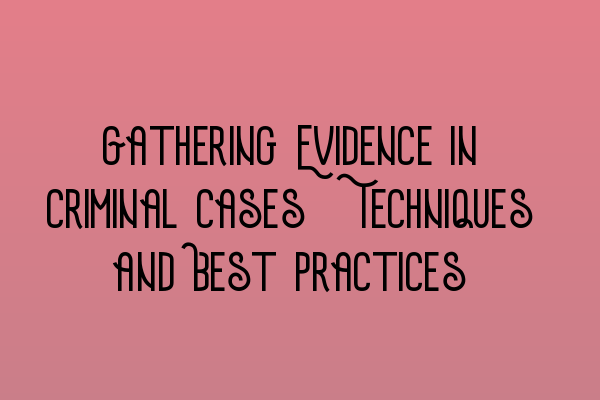Gathering Evidence in Criminal Cases: Techniques and Best Practices
When it comes to criminal cases, gathering evidence is a crucial step in building a strong defense or prosecuting those who have violated the law. Effective evidence collection can make all the difference in determining the outcome of a case.
1. Documenting the Scene
One of the first steps in gathering evidence is documenting the scene of the crime. This involves taking photographs, notes, and sketches to capture the details of the location and any potential physical evidence. It is important to be thorough and meticulous in this process, as even the smallest detail could prove vital in court.
For SQE 1 practice exam questions and practice mocks, visit SQE 1 Practice Exam Questions and SQE 1 Practice Mocks FLK1 FLK2.
2. Interviewing Witnesses
Witness testimony can be key in criminal cases, as it provides firsthand accounts of the events in question. When interviewing witnesses, it is essential to create a comfortable and secure environment where they can freely share their account. Active listening and asking open-ended questions can help gather important details and uncover any inconsistencies.
3. Collecting Physical Evidence
Physical evidence plays a critical role in criminal cases. This can include fingerprints, DNA, weapons, or any other item that may connect a suspect to the crime. Proper handling and preservation of physical evidence is crucial to ensure its admissibility in court.
4. Digital Evidence
In today’s digital age, digital evidence such as emails, text messages, social media posts, and surveillance footage can be invaluable in criminal investigations. Expertise in retrieving and analyzing digital evidence is important to uncover any relevant information that could support the case.
For SQE 2 preparation courses, visit SQE 2 Preparation Courses.
5. Expert Witnesses
Expert witnesses can provide specialized knowledge and opinions that can strengthen a case. They can explain complex concepts, analyze evidence, and provide expert testimony in court. Engaging the right expert witness can significantly impact the outcome of a trial.
6. Collaborating with Other Professionals
Building a strong case often requires collaboration with other professionals. This includes forensic experts, investigators, and analysts who can provide valuable insights and support in collecting and analyzing evidence.
For SQE 1 preparation courses and information about SRA SQE exam dates, visit SQE 1 Preparation Courses and SRA SQE Exam Dates.
Conclusion
Gathering evidence in criminal cases requires a multi-faceted approach, involving careful documentation, witness interviews, collection of physical and digital evidence, and the use of expert witnesses. By following these best practices, legal professionals can ensure they have the necessary evidence to build a solid case and pursue justice.
